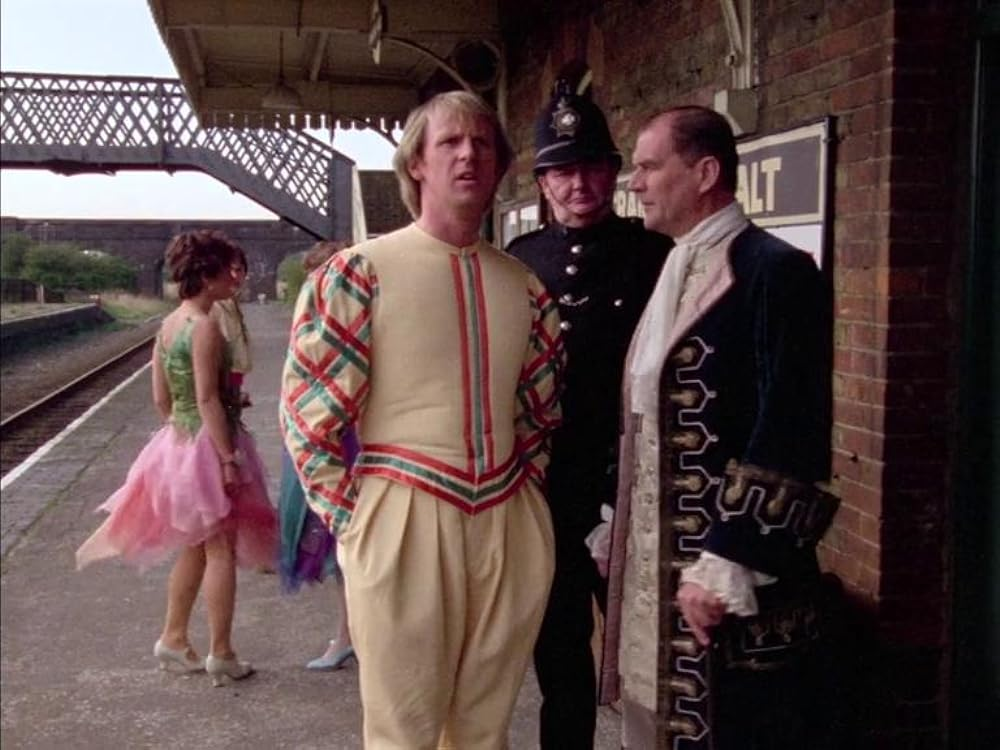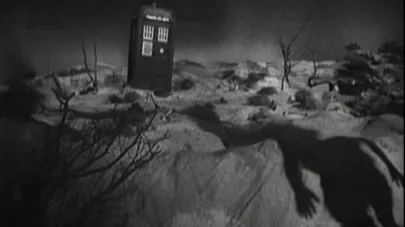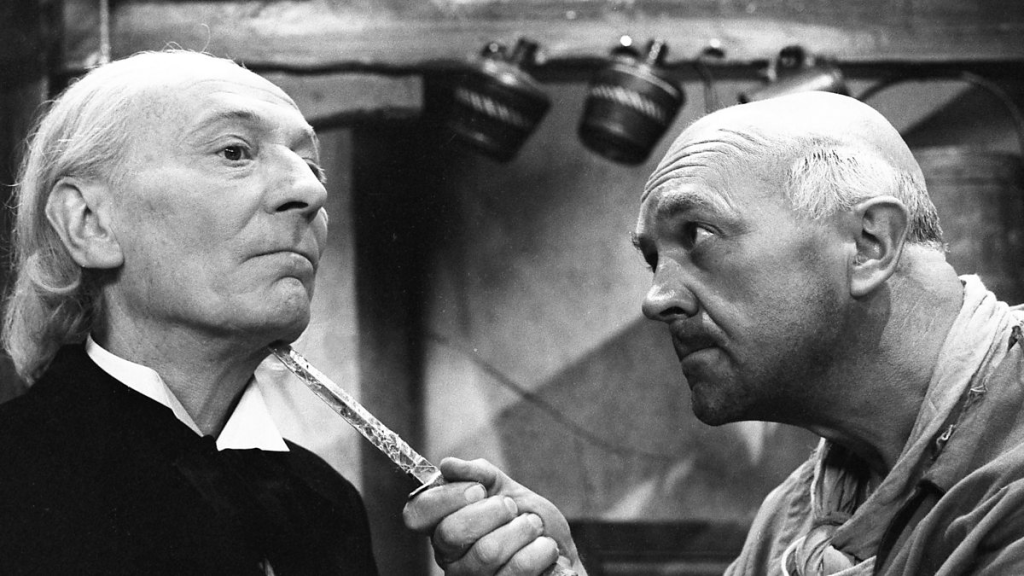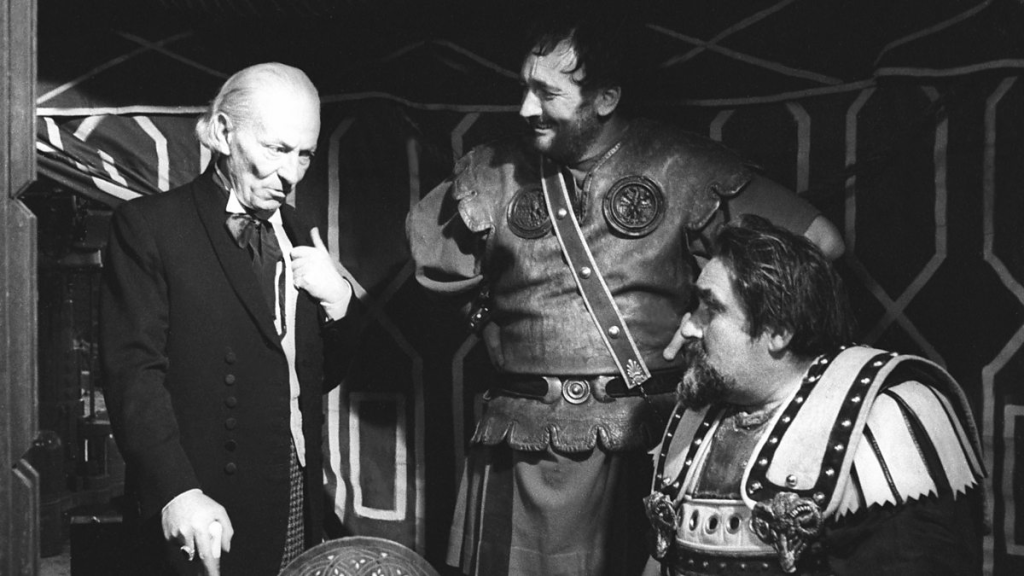This week’s Doctor Who episode, Rogue, will be this era’s second jaunt into the past, and, as usual, it seems aliens will be following. But once upon a time, sometimes, the Doctor just walked into history, and walked out. The show’s early seasons were built around being a history and science fiction program, but not combined. So making use of the BBC’s vast costume department, William Hartnell’s era of Doctor Who became an excuse to teach kids history and dive into the rich complexities of the past.
I’ve long wanted a return – at least once – to this format, and whilst I’ve seen the surviving pure historicals in the past, I wanted to experience them all for the purposes of a list. Whilst sadly most of them have been purged from the archives, as they were frequently deemed to be “lesser” than the science fiction stories (although that mentality didn’t save Master Plan), they survive through audio and reconstructions, and many fans yearn for a return. So, to celebrate the Doctor’s latest trip into the past, let’s have a literal trip to the past into Doctor Who’s early years, with a 20 year later detour to start –
12. Black Orchid
One of John Nathan-Turner’s goals with his soft reboot of the show in 1982 was a return to the old formula, with four main characters and alternating sci-fi and history. Unfortunately, this two part oddity in the middle of Peter Davison’s first season really doesn’t justify itself, and is a waste of the format. The Doctor and his companions end up in the 1920s, the Doctor plays some cricket, Adric eats food, Tegan dances, Nyssa has a double and then BOOM MURDER MASKED KILLER LET’S RESOLVE THE PLOT. That’s it. Not very interesting.
Of all the fascinating historical events to explore, I’m confused why Terence Dudley decided to just… not do history at all, and just stick the characters into a bland cliche of the times. Sure, you can argue that George Cranleigh represents the dark side of British imperialism hidden under the wealth and prosperity of the mansion and that this reflects the coming darkness of Earthshock… but no way was that intentional. At all. This can’t be the last televised pure historical! We need another!
11. An Unearthly Child
Does this count? I mean, there’s no aliens or sci-fi other that the presence of the Doctor and his companions, and, additionally, the non-history bit is the iconic part. The first episode that captivated millions, the start of it all. But it has nothing to do with anything else in the story!
Doctor Who’s first story is a pure historical set in the dawn of time, when man is just discovering fire. Throwing in the characters into this harsh wasteland immediately sets the tone of the season, that of a disparate team of survivors, not yet companions. Is it historical? I dunno, most leave it out of pure historical lists, but whilst the cavemen stuff isn’t the most interesting, it set the stage for how historicals would be approached for the next few years – no need for alien plots when the drama of human survivors is much more interesting. The format would be fine-tuned and improved, as we’ll see in this list.
10. The Reign of Terror
In An Unearthly Child, Susan reads a book on the French Revolution. As a bookend, the show’s first season finale pits the travellers against the very dangerous bloody aftermath of the Revolution during Robespierre’s titular crusade against all those he saw as enemies. The first episode, with Susan and Barbara kidnapped, Ian imprisoned and the Doctor stuck in a burning barn, is a cracker, brutal and gripping.
The rest of the serial can be a struggle, at six parts I don’t quite think it’s as lean or mean as it could have been, and it’s hard to ignore how utterly useless the companions are here, just sitting around or getting caught. This is William Hartnell’s show, as he masquerades as a French police officer to get his friends out of prison, whilst also having immense fun doing so. Whilst this is a fascinating period in history, the plotting and pacing can be slow and convoluted, so whilst I do admire it, it’s low for a reason.
9. The Highlanders
Patrick Troughton’s only pure historical, a leftover from the old regime that sees the new lead lampoon and pastiche the very premise established in the very first story, would be an obscure oddity lost to time were it not for the fact that Jamie McCrimmon, one of the most iconic Doctor Who companions of all time, was introduced here. Which is odd, because for the most part he doesn’t even serve a companion role, he was made one last minute after Frazer Hines got on well with everyone else. The rest, as they say, is history.
The story itself… I feel bad for it. The central joke is that this new Doctor is totally fed up with the pure historical format so spends the entire story running circles around the various English and Scottish sides pretending to be an insane German doctor for basically no reason. Yes, that’s what actually happens. But because it’s lost, we can’t SEE it. And the audio of his impersonation is hilarious! But the joke can’t work just as telesnaps, which is a shame because as a huge Second Doctor fan I’d have loved to see how it fully played out. The Highlanders is a last hurrah to one of Who’s most established formats, and it’s a fun little time, if a bit meandering without the Doctor.
8. The Smugglers
Now this really surprised me! Going through the reconstructions I was ready for The Smugglers to just be background noise, but thanks to a great plot and a sense of tension that exists even without footage, The Smugglers, as the last normal Doctor Who story before regeneration, is a truly underrated little gem. The Doctor, Ben and Polly land in Cornwall and get caught up in a multi-party hunt for the lost treasure of Henry Avery (yes, the guy from Curse of the Black Spot).
I’d say hijinks ensue, but it’s actually pretty solemn, but not bleak. The few bits of existing footage out there are removed segments from foreign edits, including a bit where a guy has a knife thrown into his back! Yikes! And the companions are great too, assisting the Doctor in trying to find the treasure and get out of the mess they’ve found themselves in. There’s intrigue, treasure hunting, double crossing and more. The cliffhangers are excellent, the lack of a soundtrack really grips you in an immersive experience, and overall, it’s really solid. Would be a nice surprise recovery one day, as the telesnaps show some great locations and cinematography.
7. The Gunslingers
The worst Doctor Who story of all time? The Gunfighters had a foul reputation among the “no fun allowed” fans of the 80s and 90s, made worse by the fact that this pastiche with singing survived in full when so many other classics didn’t. That definitely played a part in its reputation. But I’m sorry – this one is so fun! The Doctor needs to go to the dentist (no, really) and finds himself in Tombstone, Arizona a few days before the Gunfight at the OK Corrall. Making matters worse, he’s mistaken for Doc Holliday. And the worst part of all? Steven and Dodo have to SING AT GUNPOINT.
Yes, this is the one with the Ballad of the Last Chance Saloon. It’s the greatest thing ever, no notes. And with its depiction of legends of the Old West like Doc Holliday, Johnny Ringo and Wyatt Earp as flawed men in their own right, Donald Cotton deconstructs and plays with the tropes and myths of the Western genre, simultaneously a part of history and also an embellished fiction. It’s not as polished as his earlier exploration of similar themes, but The Gunfighters is great, and did I mention STEVEN AND DODO HAVE TO SING AT GUNPOINT?
6. The Crusade
David Whitaker is one of Who’s all time great writers, and Douglas Camfield is Who’s all time great director, flat out. Together, their take on the pure historical is the most serious and theatrical this side of John Lucarotti. The TARDIS lands in the middle of the Third Crusade, and with Barbara taken prisoner by Saladin, it’s up to the Doctor, Ian and Vicki to negotiate with Richard Lionheart with how to rescue her without a holy war breaking out.
Whitaker’s script is Shakespearian and grandiose, with neither Richard nor Saladin presented as stereotypes but as strong leaders in their own right, albeit both caught up in their own mythos. With Ian as a Knight of Jaffa sent to negotiate with Saladin, the Doctor and Vicki spend time in Richard’s Middle East court as family drama and politics spill out between Richard’s quest for personal glory and the power struggle between him and his sister Joanna. The surviving episodes paint a lush, evocative production, and whilst it can be hard to truly appreciate the missing parts due to how dense the story is, like The Highlanders, that’s not actually the story’s fault. The performances, direction and production are top notch – not a wobbly set to be found.
5. The Myth Makers
Find it, find it, find it! I love The Myth Makers, and the surviving audio depicts a witty, imaginative and layered look at mythology, heroes and history. Arriving in the Trojan War, the Doctor and Steven must go and rescue Vicki, who has been taken, along with the TARDIS, to Troy, a city about to be destroyed, as the history books say. But history can’t conclude exactly what happened during this war, only that it probably did happen. With the Doctor well aware of the story of the Trojan Horse through his own understanding of Earth history, he nonetheless accidentally creates the idea to win the war… and becomes a god as a result.
Odysseus is simply a drunken fool, not the hero of Homer’s tale, and Steven’s own insecurities are explored through his time masquerading as a Greek soldier. Donald Cotton dissects history and legend into a darkly comic tragedy about how the Doctor has not only let history unfold but CREATE history to rescue his friends, only for Vicki to decide to create her own legend by leaving the TARDIS and becoming the legendary figure Cressida. Vicki chooses, just like the Doctor, to leave her mark on history. This one’s great. FIND IT!
4. The Romans
Doctor Who as a full on farce. The story literally starts with the four travellers relaxing in a Roman villa on a much needed holiday, until the Doctor decides to just wander off to Rome out of boredom – hilarity ensues. Why need aliens when you can indulge in the Doctor and Vicki exploring Rome and getting involved in an elaborate conspiracy to murder Nero whilst the Doctor, masquerading as a lyre player he has no idea was in on the plot, is totally unaware of it? Meanwhile, Ian and Barbara have been kidnapped and are also in Rome, with neither party knowing the other are there.
With the cast on fine form and Dennis Spooner’s script full of quips (“You know, I am so constantly outwitting the opposition, I tend to forget the delights and satisfaction of the gentle art of fisticuffs” is the greatest line in Doctor Who history) in true Shakespearean fashion the story explores the banality of power and Roman society through comedy, and with its various comedic subplots all happening at the same time without ever intersecting, The Romans is, in my opinion, Who’s greatest comedy. And an incredible historical. Love it.
3. The Massacre
From Who’s greatest comedy to its darkest hour – there’s a reason I wrote an entire article about how this story created the Doctor-lite and why I felt so vindicated when 73 Yards played like a 21st version of this story. After the devastation of the Daleks’ Master Plan, you’d expect a light fluffy historical right? Nope, because the Doctor and Steven are in France four days before the Catholic rulers decide to massacre the Hugenots, and the Doctor is nowhere to be found as Steven can only watch as events he has no understanding of unfold. A man out of time, with no knowledge of the horrors about to occur, still trusts the Doctor to get him out of here. So when the Abbot of Amboise, who looks like the Doctor, enters the picture, Steven is convinced that it’s the Doctor in disguise. The heartbreaking revelations that follow test Steven and push the show to dark places that still shock without a single frame existing.
Peter Purves as newly minted leading man excels, and the story’s sombre tone methodically builds to one of the darkest 25 minutes in Doctor Who history as the Doctor, who returns in the final episode not feeling the need to explain where he’s been, will not help a single person flee the massacre. The final TARDIS scene is the stuff of legend. Sure, there’s story and logic problems, it is DEFINITELY very unconventional and slow, and it’s a tough sell, but there’s no other Who like it.
2. The Aztecs
The show’s rules of time travel are established here, in The Aztecs, the brilliant sixth story of the show’s entire run. Stuck in an Aztec city, the travellers try their best to endure Aztec society whilst Barbara, posing as an Aztec god, tries to change their culture. Knowing that their brutality is what would cause future European settlers to wipe them out, Barbara believes that by changing their ways, she can save the Aztecs. But the Doctor cannot allow that to happen, he has rules that must be obeyed, he knows that sometimes, history must play out. And the Aztecs themselves are clashing among themselves between change and tradition, with some brilliant characters. Tlotoxl is the only Doctor Who villain to win entirely, except for the small glimmer of hope that the good of Aztec culture can survive in Autloc, who ends the story doubting all he has learnt.
Phew. But it’s not all bleak. We have the Doctor’s hilarious and heartfelt subplot falling in love with Cameca (“made some cocoa and got engaged” is the SECOND greatest line in Doctor Who history) and Ian getting into fights because of course. The only real issue is Susan getting sidelined due to Carole Ann Ford’s holiday time. But when everything else is this good, when the setting and culture and dilemmas and characters are so vast and nuanced, who cares? The Aztecs is pure class, and whilst I think it’s the BEST pure historical, honestly, deciding if it should get the top spot was hard.
- Marco Polo
Head vs the heart. Head says Aztecs as number one, heart says Marco Polo as number one. And the heart wins. The real winner of course is John Lucarotti, claiming all three top spots. Marco Polo is the Holy Grail of missing Doctor Who, a sprawling seven part epic that unfolds across months and months as the travellers must travel with Marco Polo to the court of Kublai Khan as he plans to gift the TARDIS to the Khan to return home. Marco is not a villain, he’s a man of immense knowledge and culture who simply wants to return to Venice, but cannot let the travellers interrupt his journey. Over the course of the episodes, they form a complex relationship, and the Doctor, Susan, Ian and Barbara in turn learn about each other some more.
From sandstorms to assassins, games of chess to decide the fate of the TARDIS, Susan and Ping-Cho’s friendship as the two connect over their lost families and yearn for normalcy and the intrigue at the court of Kublai Khan, Marco Polo is a journey of immense contrasts, epic and intimate at the same time, and it pains me that not a single frame of it exists. But the reconstruction and audio present a narrative that whilst lost to time, is one of the finest achievements of 60s Who, where through a long journey Marco Polo becomes less of a legend and more of a man, and the Doctor in turn learns more about what heroism and the drive for purpose means. It’s incredible.
The pure historical was incorrectly deemed as outdated and not suited to Who’s purpose after 1966, when I’d argue they’d work just as well now. Going through them all has been a blast, and I’d love to add another to the list one day. Big Finish has proven they can still work, so please, Russell, use your clout and MAKE THAT PURE HISTORICAL!













